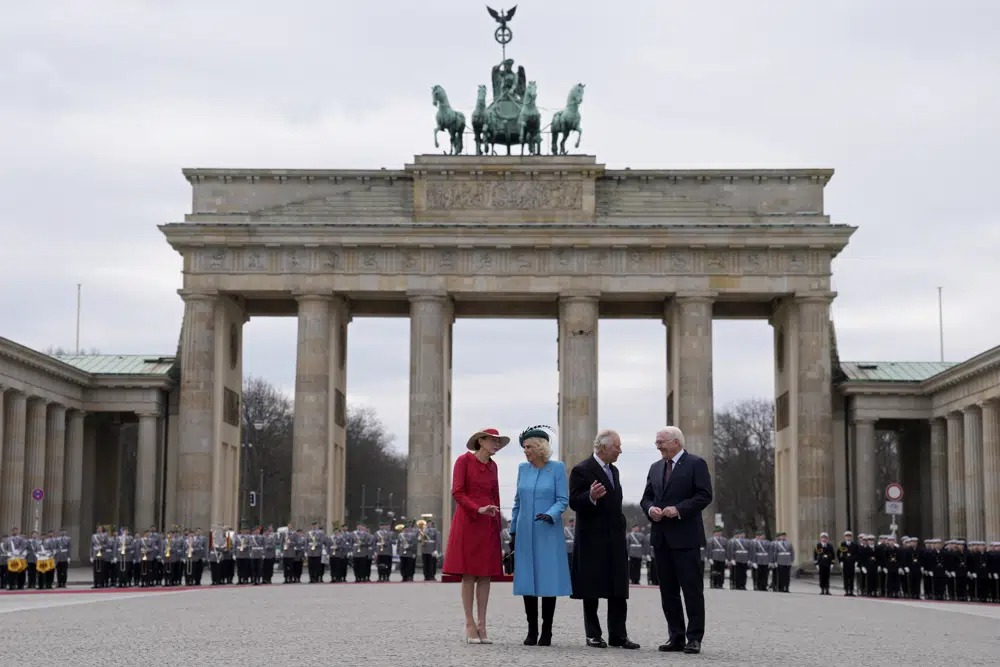King Charles III arrived in Berlin on Wednesday for his first foreign trip as Britain’s monarch, hoping to improve the U.K.’s relations with the European Union and show he can win hearts and minds abroad, just as his mother did for seven decades.
Charles and Camilla, the queen consort, landed at Berlin’s government airport in the early afternoon. The king, dressed in a black coat, and his wife, in a light blue coat and a feather-trimmed teal hat worn at a jaunty angle, paused at the top of their plane’s stairs to receive a 21-gun salute as two military jets performed a flyover.
The royal couple said in a joint statement, released on their official Twitter account, that it was a “great joy” to be able to develop the “longstanding friendship between our two nations.”
An hour later, German President Frank-Walter Steinmeier and his wife, Elke Buedenbender, welcomed them with military honors at the German capital’s historic Brandenburg Gate.
Soldiers hoisted the British and German flags as the national anthems were played. Steinmeier and Charles then strolled past the cheering, flag-waving crowd, shaking hands and chatting briefly with people.
Some took close-up pictures on their phones as Charles and Camilla approached, while others gave them flower bouquets. One woman handed Charles a gift bag. Journalists and security personnel trailed the royal couple and their German hosts as they made their way back to their motorcade.
Charles, 74, who ascended the throne after the death of Queen Elizabeth II in September, is set to be crowned on May 6. As Britain’s head of state, the king meets weekly with the prime minister and retains his mother’s role as leader of the Commonwealth.
He had initially planned to visit France before heading to Germany, but the first leg of his trip was canceled due to massive protests over the French government’s efforts to raise the country’s retirement age by two years.
Billed as a multi-day tour of the European Union’s two biggest countries, the trip was designed to underscore British Prime Minister Rishi Sunak’s efforts to rebuild relations with the bloc after six years of arguments over Brexit and highlight the countries’ shared history as they work together to combat Russian aggression in Ukraine.
Now everything rests on Germany, where the king faces the first big test of whether he can be an effective conduit for the “soft power” the House of Windsor has traditionally wielded, helping Britain pursue its geopolitical goals through the glitz and glamour of a 1,000-year-old monarchy.
Charles, a former naval officer who is the first British monarch to earn a university degree, is expected to insert heft where his glamorous mother once wielded star power. His visit to Germany will give him an opportunity to highlight the causes he holds dear, like environmental protection.
During an afternoon reception at Palace Bellevue, the German president’s official residence, Steinmeier lauded Charles for his long-time commitment to creating a more sustainable world.
“You are, quite literally, the driving forces behind the energy transition,” Steinmeier said. “You are helping to make the world a better place.”
Charles met with German government ministers, experts and advocacy group representatives during the reception. A white tie dinner at the presidential palace is scheduled for Wednesday night.
On Thursday, the king is scheduled to give a speech to the Bundestag, Germany’s parliament. He will also meet Chancellor Olaf Scholz, talk to Ukrainian refugees, and meet with British and Germany military personnel who are working together on joint projects. In the afternoon he will visit an organic farm outside of Berlin.
The royal couple plan to go to Hamburg on Friday, where they will visit the Kindertransport memorial for Jewish children who fled from Germany to Britain during the Third Reich, and attend a green energy event before returning to the U.K.
The king was urged to make the trip by Sunak, who during his first six months in office negotiated a settlement to the long-running dispute over post-Brexit trading rules for Northern Ireland and reached a deal with France to combat the people smugglers ferrying migrants across the English Channel in small boats. Sunak hopes goodwill created by a royal visit can help pave the way for progress on other issues, including Britain’s return to an EU program that funds scientific research across Europe.
Britain’s senior royals are among the most recognizable people on the planet. While their formal powers are strictly limited by law and tradition, they draw attention from the media and the public partly because of the historic ceremonies and regalia that accompany them — and also because the public is fascinated by their personal lives.
Elizabeth’s influence stemmed in part from the fact that she made more than 100 state visits during her 70 years on the throne, meeting presidents and prime ministers around the world in a reign that lasted from the Cold War to the information age.
Politicians were eager to meet the monarch for tea, if for no other reason than she’d been around so long.
(AP)












3 Responses
“longstanding friendship between our two nations”
Really? Barely 70 years of friendship following hundreds of years of strife can hardly be considered “longstanding”.
IC, what do you mean by “following hundreds of years of strife”? On the contrary, Germany did not exist until the late 19th century, but the UK generally had very good relationships with the various German states that eventually joined together to make Germany. Especially with Prussia, with Hanover, where the royal family came from, and with Saxe-Coburg and Gotha, Prince Albert’s home. Conflict with Germany only began in approximately the 1890s, and lasted only about 50 years.
Let’s not forget that the House of Windsor is merely a renamed House of Saxe-Coburg and Gotha, of German origin. They are the successors of the House of Hanover — and the British royals, who are all of course of German descent, were the rulers of the Duchy of Brunswick (Germany) until 1918.